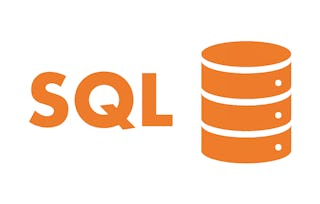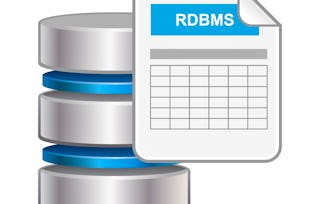Master the art of relational databases with this comprehensive course, designed to equip you with essential skills for database modeling, design, and implementation. You’ll start with core concepts like Entity-Relationship (ER) modeling, progressing through relational algebra and foundational SQL commands for creating, manipulating, and querying databases.

Relational Databases
Saisissez l'occasion de faire des économies ! Bénéficiez de 40 % de réduction sur 3 mois de Coursera Plus et d'un accès complet à des milliers de cours.

Expérience recommandée
Ce que vous apprendrez
Design comprehensive database schemas using ER modeling and normalization, transform conceptual models into efficient relational structures.
Execute complex SQL operations for data manipulation and querying, master DDL and DML statements to manage database content effectively.
Implement transaction processing and concurrency control mechanisms, apply indexing and optimization techniques for high-performance systems.
Compétences que vous acquerrez
- Catégorie : Transaction Processing
- Catégorie : Problem Solving
- Catégorie : Database Architecture and Administration
- Catégorie : Database Theory
- Catégorie : Data Management
- Catégorie : Data Storage
- Catégorie : SQL
- Catégorie : Data Integrity
- Catégorie : Information Architecture
- Catégorie : Database Management
- Catégorie : Data Analysis
- Catégorie : Database Design
- Catégorie : Data Modeling
- Catégorie : Information Technology
- Catégorie : Performance Tuning
- Catégorie : Logical Reasoning
- Catégorie : Databases
- Catégorie : System Design and Implementation
Outils que vous découvrirez
- Catégorie : Relational Databases
- Catégorie : Query Languages
Détails à connaître

Ajouter à votre profil LinkedIn
novembre 2025
Découvrez comment les employés des entreprises prestigieuses maîtrisent des compétences recherchées

Il y a 10 modules dans ce cours
Instructeur

En savoir plus sur Software Development
 Statut : Essai gratuit
Statut : Essai gratuit Statut : Essai gratuit
Statut : Essai gratuitIllinois Tech
 Statut : Prévisualisation
Statut : PrévisualisationUniversitat Politècnica de València
 Statut : Essai gratuit
Statut : Essai gratuit
Pour quelles raisons les étudiants sur Coursera nous choisissent-ils pour leur carrière ?

Felipe M.

Jennifer J.

Larry W.

Chaitanya A.

Ouvrez de nouvelles portes avec Coursera Plus
Accès illimité à 10,000+ cours de niveau international, projets pratiques et programmes de certification prêts à l'emploi - tous inclus dans votre abonnement.
Faites progresser votre carrière avec un diplôme en ligne
Obtenez un diplôme auprès d’universités de renommée mondiale - 100 % en ligne
Rejoignez plus de 3 400 entreprises mondiales qui ont choisi Coursera pour les affaires
Améliorez les compétences de vos employés pour exceller dans l’économie numérique
Foire Aux Questions
Plus de questions
Aide financière disponible,
¹ Certains travaux de ce cours sont notés par l'IA. Pour ces travaux, vos Données internes seront utilisées conformément à Notification de confidentialité de Coursera.

